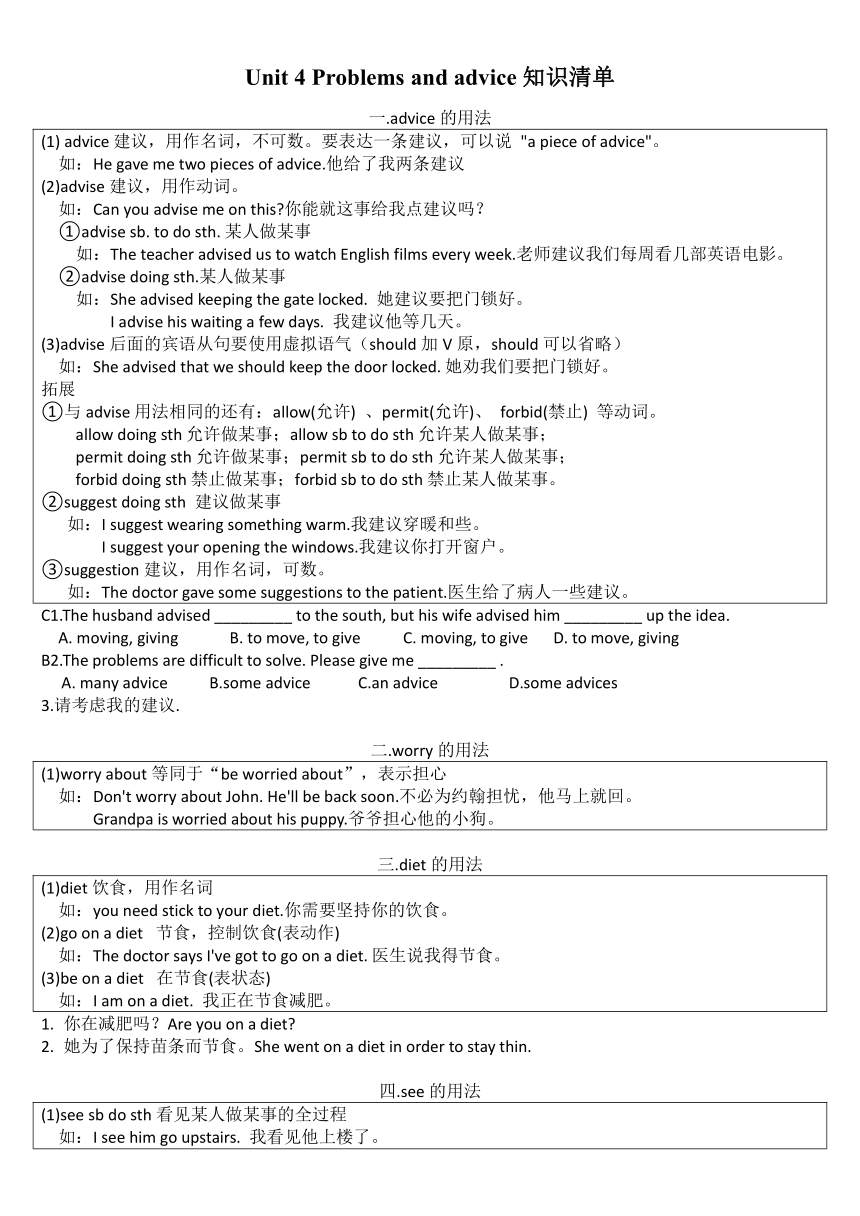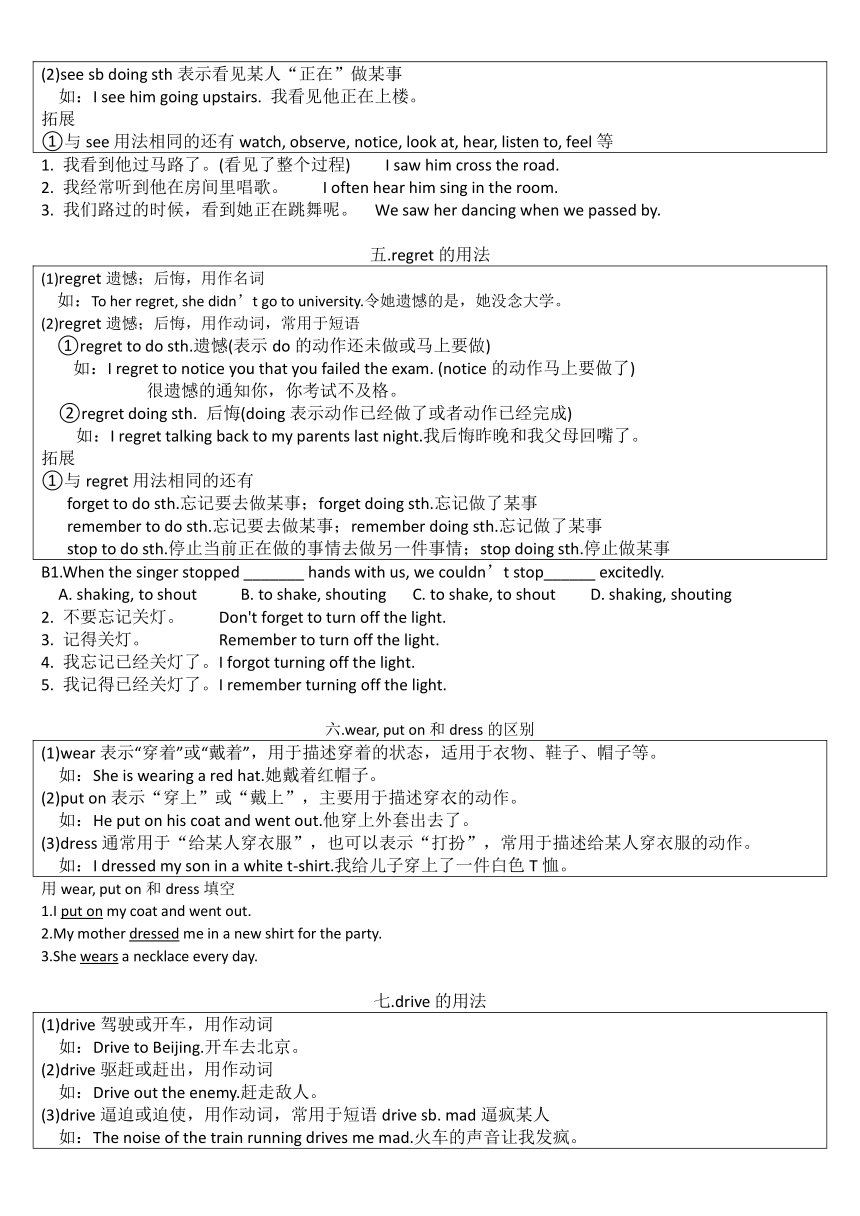沪教牛津版(广州深圳沈阳通用)九年级上册Module 2 Ideas and viewpoints Unit 4重点短语和知识
文档属性
| 名称 | 沪教牛津版(广州深圳沈阳通用)九年级上册Module 2 Ideas and viewpoints Unit 4重点短语和知识 |

|
|
| 格式 | docx | ||
| 文件大小 | 25.6KB | ||
| 资源类型 | 教案 | ||
| 版本资源 | 牛津深圳版 | ||
| 科目 | 英语 | ||
| 更新时间 | 2024-10-05 21:18:28 | ||
图片预览


文档简介
Unit 4 Problems and advice知识清单
一.advice的用法
(1) advice 建议,用作名词,不可数。要表达一条建议,可以说 "a piece of advice"。 如:He gave me two pieces of advice.他给了我两条建议 (2)advise建议,用作动词。 如:Can you advise me on this 你能就这事给我点建议吗? ①advise sb. to do sth. 某人做某事 如:The teacher advised us to watch English films every week.老师建议我们每周看几部英语电影。 ②advise doing sth.某人做某事 如:She advised keeping the gate locked. 她建议要把门锁好。 I advise his waiting a few days. 我建议他等几天。 (3)advise后面的宾语从句要使用虚拟语气(should加V原,should可以省略) 如:She advised that we should keep the door locked. 她劝我们要把门锁好。 拓展 ①与advise 用法相同的还有:allow(允许) 、permit(允许)、 forbid(禁止) 等动词。 allow doing sth 允许做某事;allow sb to do sth 允许某人做某事; permit doing sth 允许做某事;permit sb to do sth 允许某人做某事; forbid doing sth 禁止做某事;forbid sb to do sth 禁止某人做某事。 ②suggest doing sth 建议做某事 如:I suggest wearing something warm.我建议穿暖和些。 I suggest your opening the windows.我建议你打开窗户。 ③suggestion建议,用作名词,可数。 如:The doctor gave some suggestions to the patient.医生给了病人一些建议。
C1.The husband advised _________ to the south, but his wife advised him _________ up the idea.
A. moving, giving B. to move, to give C. moving, to give D. to move, giving
B2.The problems are difficult to solve. Please give me _________ .
A. many advice B.some advice C.an advice D.some advices
3.请考虑我的建议.
二.worry的用法
(1)worry about等同于“be worried about”,表示担心 如:Don't worry about John. He'll be back soon.不必为约翰担忧,他马上就回。 Grandpa is worried about his puppy.爷爷担心他的小狗。
三.diet的用法
(1)diet饮食,用作名词 如:you need stick to your diet.你需要坚持你的饮食。 (2)go on a diet 节食,控制饮食(表动作) 如:The doctor says I've got to go on a diet. 医生说我得节食。 (3)be on a diet 在节食(表状态) 如:I am on a diet. 我正在节食减肥。
你在减肥吗?Are you on a diet
她为了保持苗条而节食。She went on a diet in order to stay thin.
四.see的用法
(1)see sb do sth看见某人做某事的全过程 如:I see him go upstairs. 我看见他上楼了。 (2)see sb doing sth表示看见某人“正在”做某事 如:I see him going upstairs. 我看见他正在上楼。 拓展 ①与see 用法相同的还有watch, observe, notice, look at, hear, listen to, feel等
1. 我看到他过马路了。(看见了整个过程) I saw him cross the road.
2. 我经常听到他在房间里唱歌。 I often hear him sing in the room.
3. 我们路过的时候,看到她正在跳舞呢。 We saw her dancing when we passed by.
五.regret的用法
(1)regret遗憾;后悔,用作名词 如:To her regret, she didn’t go to university.令她遗憾的是,她没念大学。 (2)regret遗憾;后悔,用作动词,常用于短语 ①regret to do sth.遗憾(表示do的动作还未做或马上要做) 如:I regret to notice you that you failed the exam. (notice的动作马上要做了) 很遗憾的通知你,你考试不及格。 ②regret doing sth. 后悔(doing表示动作已经做了或者动作已经完成) 如:I regret talking back to my parents last night.我后悔昨晚和我父母回嘴了。 拓展 ①与regret用法相同的还有 forget to do sth.忘记要去做某事;forget doing sth.忘记做了某事 remember to do sth.忘记要去做某事;remember doing sth.忘记做了某事 stop to do sth.停止当前正在做的事情去做另一件事情;stop doing sth.停止做某事
B1.When the singer stopped _______ hands with us, we couldn’t stop______ excitedly.
A. shaking, to shout B. to shake, shouting C. to shake, to shout D. shaking, shouting
2. 不要忘记关灯。 Don't forget to turn off the light.
3. 记得关灯。 Remember to turn off the light.
4. 我忘记已经关灯了。I forgot turning off the light.
5. 我记得已经关灯了。I remember turning off the light.
六.wear, put on和dress的区别
(1)wear表示“穿着”或“戴着”,用于描述穿着的状态,适用于衣物、鞋子、帽子等。 如:She is wearing a red hat.她戴着红帽子。 (2)put on表示“穿上”或“戴上”,主要用于描述穿衣的动作。 如:He put on his coat and went out.他穿上外套出去了。 (3)dress通常用于“给某人穿衣服”,也可以表示“打扮”,常用于描述给某人穿衣服的动作。 如:I dressed my son in a white t-shirt.我给儿子穿上了一件白色T恤。
用wear, put on和dress填空
1.I put on my coat and went out.
2.My mother dressed me in a new shirt for the party.
3.She wears a necklace every day.
七.drive的用法
(1)drive驾驶或开车,用作动词 如:Drive to Beijing.开车去北京。 (2)drive驱赶或赶出,用作动词 如:Drive out the enemy.赶走敌人。 (3)drive逼迫或迫使,用作动词,常用于短语drive sb. mad逼疯某人 如:The noise of the train running drives me mad.火车的声音让我发疯。
八.without的用法
(1)without是个介词(介词后接Ving) 如:He left without saying a word.他一句话没说就离开了。
九.keep的用法
(1)keep保持……状态,常用于"keep + 形容词"的结构 如:Please keep quiet.请保持安静。 (2)keep一直做某事,常用于"keep sb. doing sth."的结构 如:He kept me waiting for an hour.他让我等了一个小时。 (3)keep阻止……做某事,常用于"keep sb. from doing sth."的结构 如:We should keep farmers from cutting down the trees.我们应该阻止农民们砍树。 (4)keep继续做某事,常用于"keep on doing sth."的结构 如:Prices keep on increasing.价格不停地上涨。 (5)keep sth. in mind" 表示记住某事 如:Of course, repair work is expensive and you have to keep that in mind. 当然,维修费很昂贵,你必须记住这一点。
1.他在英语课上总是提问题。He kept on asking questions in the English class.
2.把门关上,保持房间温暖。Close the door and keep the room warm.
3.请别让孩子到海里游泳。Please keep the children from swimming in the sea.
十.similar的用法
(1)similar相似的,用作形容词,常用于短语be similar to 如:All babies are similar to each other所有的宝宝都很相似。 拓展 (1)be different from与...不一样 (2)the same as与...一样
This pen is the same as mine.
My best friend Mary is different from me.
Tom is similar to Jack in solving the problem.
十一.because和because of的区别
(1)because后接句子 如:I went to bed early because I was tired.我很早就上床睡觉了,因为我累了。 (2)because of后接短语 如:I went to bed early because of my tiredness.我因为疲劳而提早上床睡觉了。
1.I didn't buy it because it was too expensive.
2.He lost his job because of his age.
十二.why don’t you的用法
(1)why don’t you为什么不,后接动词原形 如:Why don’t you come with us 为什么不和我们一起去呢? (2)why not为什么不,后接动词原形 如:Why not just try a new restaurant 为什么不尝试一家新餐厅呢?
1.晚饭后为什么不去散步?Why not go for a walk after dinner
2.为什么不再试一次呢?Why not try again
3.为什么不去接电话呢?Why not answer the phone
十三.busy的用法
(1)busy忙碌的,用作形容词,常用于短语 ①be busy doing sth.忙于某事 如:I'm busy working on my project.我正在忙着我的项目。 ②be busy with sth.忙于某事 如:Let's get busy with the clearing up.我们开始清理吧。 拓展 (1)none of your business与你无关 It is none of your business.这跟你无关。 (2)on business出差 He is on business.他正在出差
学生们正在忙于他们的家庭作业。The students are busy with their homework.
学生们正在忙于他们的家庭作业。The students are busy doing their homework.
十四.alone和lonely的区别
alone 独自的 Seesaws are not very fun when you're alone.当你孤身一人时,跷跷板就不那么有趣了。
lonely 孤单的 The girl felt so lonely in this empty house.女孩一个人在这空荡的房间里,觉得非常孤独。
So we never feel lonely.
He will be alone from now on.
十五.borrow的用法
(1)borrow借入,用作动词,常用于短语borrow sth. from sb. 如:I borrowed a bike from my friend. 我从朋友那里借了一辆自行车。 (2)lend借出,用作动词,常用于短语lend sth. to sb. 如:Mary lent her bike to Tom.玛丽把她的自行车借给了汤姆。 注意 borrow和lend都是瞬间动词,不能与一段时间连用。若要接一段时间,用keep。 如:Peter borrowed a book from the library. He lent it to me yesterday and told me that I could keep it for a week. 彼得从图书馆借了一本书。他昨天把它借给我,告诉我可以保存一个星期。
1.我从图书馆借了一本书。I borrowed a book from the library.
2.你能把你的笔借给我吗?Can you lend your pen to me
十六.try的用法
(1)try to do sth.努力去做某事 如:I tried to finish the project on time.我努力按时完成项目。 (2)try doing sth.尝试做某事 如:I have tried talking to her about the issue. 我尝试和她讨论这个问题。 (3)try one's best to do sth.尽某人最大的努力去做某事 如:He tried his best to solve the problem.他尽力解决了这个问题。 (4)have a try试一试 如:Let's have a try and see if we can make it work.让我们试一试,看看是否能让它工作。
1.你想试试吗? Do you want to have a try
2.他已经尽最大努力去帮助他们。He has tried his best to help them.
3.Tina正在努力的完成她的家庭作业。 Tina is trying to finish her homework.
4.我尝试着做了一个蛋糕。I tried making a cake.
一.advice的用法
(1) advice 建议,用作名词,不可数。要表达一条建议,可以说 "a piece of advice"。 如:He gave me two pieces of advice.他给了我两条建议 (2)advise建议,用作动词。 如:Can you advise me on this 你能就这事给我点建议吗? ①advise sb. to do sth. 某人做某事 如:The teacher advised us to watch English films every week.老师建议我们每周看几部英语电影。 ②advise doing sth.某人做某事 如:She advised keeping the gate locked. 她建议要把门锁好。 I advise his waiting a few days. 我建议他等几天。 (3)advise后面的宾语从句要使用虚拟语气(should加V原,should可以省略) 如:She advised that we should keep the door locked. 她劝我们要把门锁好。 拓展 ①与advise 用法相同的还有:allow(允许) 、permit(允许)、 forbid(禁止) 等动词。 allow doing sth 允许做某事;allow sb to do sth 允许某人做某事; permit doing sth 允许做某事;permit sb to do sth 允许某人做某事; forbid doing sth 禁止做某事;forbid sb to do sth 禁止某人做某事。 ②suggest doing sth 建议做某事 如:I suggest wearing something warm.我建议穿暖和些。 I suggest your opening the windows.我建议你打开窗户。 ③suggestion建议,用作名词,可数。 如:The doctor gave some suggestions to the patient.医生给了病人一些建议。
C1.The husband advised _________ to the south, but his wife advised him _________ up the idea.
A. moving, giving B. to move, to give C. moving, to give D. to move, giving
B2.The problems are difficult to solve. Please give me _________ .
A. many advice B.some advice C.an advice D.some advices
3.请考虑我的建议.
二.worry的用法
(1)worry about等同于“be worried about”,表示担心 如:Don't worry about John. He'll be back soon.不必为约翰担忧,他马上就回。 Grandpa is worried about his puppy.爷爷担心他的小狗。
三.diet的用法
(1)diet饮食,用作名词 如:you need stick to your diet.你需要坚持你的饮食。 (2)go on a diet 节食,控制饮食(表动作) 如:The doctor says I've got to go on a diet. 医生说我得节食。 (3)be on a diet 在节食(表状态) 如:I am on a diet. 我正在节食减肥。
你在减肥吗?Are you on a diet
她为了保持苗条而节食。She went on a diet in order to stay thin.
四.see的用法
(1)see sb do sth看见某人做某事的全过程 如:I see him go upstairs. 我看见他上楼了。 (2)see sb doing sth表示看见某人“正在”做某事 如:I see him going upstairs. 我看见他正在上楼。 拓展 ①与see 用法相同的还有watch, observe, notice, look at, hear, listen to, feel等
1. 我看到他过马路了。(看见了整个过程) I saw him cross the road.
2. 我经常听到他在房间里唱歌。 I often hear him sing in the room.
3. 我们路过的时候,看到她正在跳舞呢。 We saw her dancing when we passed by.
五.regret的用法
(1)regret遗憾;后悔,用作名词 如:To her regret, she didn’t go to university.令她遗憾的是,她没念大学。 (2)regret遗憾;后悔,用作动词,常用于短语 ①regret to do sth.遗憾(表示do的动作还未做或马上要做) 如:I regret to notice you that you failed the exam. (notice的动作马上要做了) 很遗憾的通知你,你考试不及格。 ②regret doing sth. 后悔(doing表示动作已经做了或者动作已经完成) 如:I regret talking back to my parents last night.我后悔昨晚和我父母回嘴了。 拓展 ①与regret用法相同的还有 forget to do sth.忘记要去做某事;forget doing sth.忘记做了某事 remember to do sth.忘记要去做某事;remember doing sth.忘记做了某事 stop to do sth.停止当前正在做的事情去做另一件事情;stop doing sth.停止做某事
B1.When the singer stopped _______ hands with us, we couldn’t stop______ excitedly.
A. shaking, to shout B. to shake, shouting C. to shake, to shout D. shaking, shouting
2. 不要忘记关灯。 Don't forget to turn off the light.
3. 记得关灯。 Remember to turn off the light.
4. 我忘记已经关灯了。I forgot turning off the light.
5. 我记得已经关灯了。I remember turning off the light.
六.wear, put on和dress的区别
(1)wear表示“穿着”或“戴着”,用于描述穿着的状态,适用于衣物、鞋子、帽子等。 如:She is wearing a red hat.她戴着红帽子。 (2)put on表示“穿上”或“戴上”,主要用于描述穿衣的动作。 如:He put on his coat and went out.他穿上外套出去了。 (3)dress通常用于“给某人穿衣服”,也可以表示“打扮”,常用于描述给某人穿衣服的动作。 如:I dressed my son in a white t-shirt.我给儿子穿上了一件白色T恤。
用wear, put on和dress填空
1.I put on my coat and went out.
2.My mother dressed me in a new shirt for the party.
3.She wears a necklace every day.
七.drive的用法
(1)drive驾驶或开车,用作动词 如:Drive to Beijing.开车去北京。 (2)drive驱赶或赶出,用作动词 如:Drive out the enemy.赶走敌人。 (3)drive逼迫或迫使,用作动词,常用于短语drive sb. mad逼疯某人 如:The noise of the train running drives me mad.火车的声音让我发疯。
八.without的用法
(1)without是个介词(介词后接Ving) 如:He left without saying a word.他一句话没说就离开了。
九.keep的用法
(1)keep保持……状态,常用于"keep + 形容词"的结构 如:Please keep quiet.请保持安静。 (2)keep一直做某事,常用于"keep sb. doing sth."的结构 如:He kept me waiting for an hour.他让我等了一个小时。 (3)keep阻止……做某事,常用于"keep sb. from doing sth."的结构 如:We should keep farmers from cutting down the trees.我们应该阻止农民们砍树。 (4)keep继续做某事,常用于"keep on doing sth."的结构 如:Prices keep on increasing.价格不停地上涨。 (5)keep sth. in mind" 表示记住某事 如:Of course, repair work is expensive and you have to keep that in mind. 当然,维修费很昂贵,你必须记住这一点。
1.他在英语课上总是提问题。He kept on asking questions in the English class.
2.把门关上,保持房间温暖。Close the door and keep the room warm.
3.请别让孩子到海里游泳。Please keep the children from swimming in the sea.
十.similar的用法
(1)similar相似的,用作形容词,常用于短语be similar to 如:All babies are similar to each other所有的宝宝都很相似。 拓展 (1)be different from与...不一样 (2)the same as与...一样
This pen is the same as mine.
My best friend Mary is different from me.
Tom is similar to Jack in solving the problem.
十一.because和because of的区别
(1)because后接句子 如:I went to bed early because I was tired.我很早就上床睡觉了,因为我累了。 (2)because of后接短语 如:I went to bed early because of my tiredness.我因为疲劳而提早上床睡觉了。
1.I didn't buy it because it was too expensive.
2.He lost his job because of his age.
十二.why don’t you的用法
(1)why don’t you为什么不,后接动词原形 如:Why don’t you come with us 为什么不和我们一起去呢? (2)why not为什么不,后接动词原形 如:Why not just try a new restaurant 为什么不尝试一家新餐厅呢?
1.晚饭后为什么不去散步?Why not go for a walk after dinner
2.为什么不再试一次呢?Why not try again
3.为什么不去接电话呢?Why not answer the phone
十三.busy的用法
(1)busy忙碌的,用作形容词,常用于短语 ①be busy doing sth.忙于某事 如:I'm busy working on my project.我正在忙着我的项目。 ②be busy with sth.忙于某事 如:Let's get busy with the clearing up.我们开始清理吧。 拓展 (1)none of your business与你无关 It is none of your business.这跟你无关。 (2)on business出差 He is on business.他正在出差
学生们正在忙于他们的家庭作业。The students are busy with their homework.
学生们正在忙于他们的家庭作业。The students are busy doing their homework.
十四.alone和lonely的区别
alone 独自的 Seesaws are not very fun when you're alone.当你孤身一人时,跷跷板就不那么有趣了。
lonely 孤单的 The girl felt so lonely in this empty house.女孩一个人在这空荡的房间里,觉得非常孤独。
So we never feel lonely.
He will be alone from now on.
十五.borrow的用法
(1)borrow借入,用作动词,常用于短语borrow sth. from sb. 如:I borrowed a bike from my friend. 我从朋友那里借了一辆自行车。 (2)lend借出,用作动词,常用于短语lend sth. to sb. 如:Mary lent her bike to Tom.玛丽把她的自行车借给了汤姆。 注意 borrow和lend都是瞬间动词,不能与一段时间连用。若要接一段时间,用keep。 如:Peter borrowed a book from the library. He lent it to me yesterday and told me that I could keep it for a week. 彼得从图书馆借了一本书。他昨天把它借给我,告诉我可以保存一个星期。
1.我从图书馆借了一本书。I borrowed a book from the library.
2.你能把你的笔借给我吗?Can you lend your pen to me
十六.try的用法
(1)try to do sth.努力去做某事 如:I tried to finish the project on time.我努力按时完成项目。 (2)try doing sth.尝试做某事 如:I have tried talking to her about the issue. 我尝试和她讨论这个问题。 (3)try one's best to do sth.尽某人最大的努力去做某事 如:He tried his best to solve the problem.他尽力解决了这个问题。 (4)have a try试一试 如:Let's have a try and see if we can make it work.让我们试一试,看看是否能让它工作。
1.你想试试吗? Do you want to have a try
2.他已经尽最大努力去帮助他们。He has tried his best to help them.
3.Tina正在努力的完成她的家庭作业。 Tina is trying to finish her homework.
4.我尝试着做了一个蛋糕。I tried making a cake.
